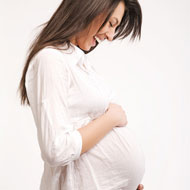Ectopic Pregnancy Tests, Causes & Symptoms
Ectopic pregnancy is a type of complication in pregnancy in which the fertilized ovum develops outside the womb. The ovum develops in other tissue, mostly in the fallopian tubes and may occur in the ovaries, cervix, or abdomen. Only 1% of pregnancies turn out to be ectopic and in this more than 98% of the implantation occurs in the fallopian tubes.
Hence, it is also called ‘tubal pregnancy’. Ectopic pregnancy is a medical emergency and unless treated properly it can lead to death of the patient. As the embryo gets implanted in other tissue there is greater damage to the tissue as it tries to get sufficient supply of blood.
Causes of Ectopic Pregnancy
The causes of ectopic pregnancy include pelvic inflammatory disease (often caused by sexually transmitted infections), infertility, use of an intra uterine device (IUD), earlier tubal surgery, previous ectopic pregnancy, smoking, contraceptive pills, and pregnancy after 35 years of age.
In ectopic pregnancy, the embryo burrows itself in other tissues and causes internal bleeding and can lead to tubal abortion. This is commonly thought to be a miscarriage. Sometimes the bleeding can be severe and threaten the health or life of the woman. This is often caused by a delays in diagnosis.
Symptoms of Ectopic Pregnancy
The signs of an ectopic pregnancy include pain in the lower abdomen, which can be confused with severe stomach pain, strong cramps, pain while urinating, mild vaginal bleeding, pain on the tips of the shoulders, lower back pain, and pain during bowel movements.
Ectopic Pregnancy Tests
Ectopic pregnancy tests are considered when the woman has vaginal bleeding and abdominal pain and has been tested positive for pregnancy. An ultrasound which shows the gestational sac with fetal heart embedded in the fallopian tube is a clear evidence of an ectopic pregnancy.
Another pregnancy test is checking the abnormal rise in β-human chorionic gonadotropin (βhCG).
Ectopic pregnancy is found in the first 5-10 weeks of pregnancy. It is best to go the doctor as soon as you notice any of the symptoms; otherwise, the complications are severe and can rupture the fallopian tube and cause severe bleeding as the fetus continues to grow.
The treatment lies in laparoscopic examination and surgery is performed if the tube is not ruptured. In other cases an abdominal surgery is required. An ectopic pregnancy can affect fertility if the fallopian tubes are damaged. However, if the fallopian tubes are okay, the woman can conceive again.


